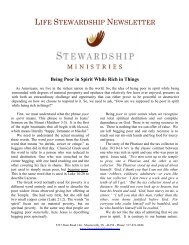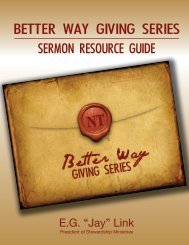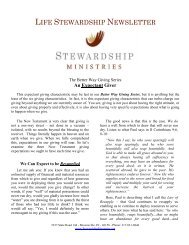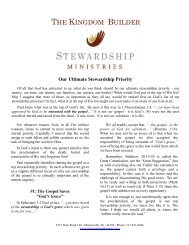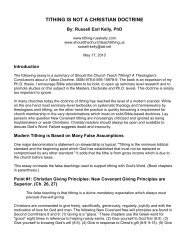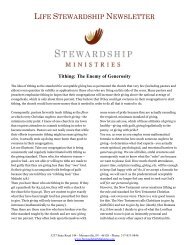âWill a Man Rob God?â (Malachi 3:8) - Biblical Foundations
âWill a Man Rob God?â (Malachi 3:8) - Biblical Foundations
âWill a Man Rob God?â (Malachi 3:8) - Biblical Foundations
Create successful ePaper yourself
Turn your PDF publications into a flip-book with our unique Google optimized e-Paper software.
8<br />
from this being a universal Law. It is doubtful that Jacob would have put a condition on<br />
something he believed to be a law from <strong>God</strong>. 43<br />
Conclusion<br />
The evidence from the period prior to the Mosaic Law suggests that no system of tithing was in<br />
place. No command to tithe is recorded, and thus the evidence that any systematic tithing existed<br />
prior to the giving of the Law is scarce if not non-existing. What is more, all giving discussed<br />
prior to the Mosaic Law is voluntary. 44 In fact, many passages throughout the Old Testament<br />
discuss voluntary giving. 45 Involuntary giving existed as well, one example being a twenty<br />
percent tax in Egypt. 46 Joseph, second only to Pharaoh, collected a twenty percent tax because of<br />
the coming drought. This tax was given to the Egyptian government. 47 Voluntary giving “is<br />
directed toward the Lord in an attitude of love and sacrifice,” and involuntary giving “is given to<br />
the national entity for the supply of the needs of the people.” 48<br />
However, since much of the argument is based upon silence, there remains the possibility<br />
that tithing did exist. This is not problematic. Another custom existed before the Law, was<br />
incorporated into the Law, but is not necessary in the new covenant: circumcision. 49 There is<br />
virtually no controversy in modern-day Christianity over the necessity of circumcision; it is not a<br />
requirement for Christians. Circumcision is first recorded as a command of <strong>God</strong> for Abraham<br />
and his descendants (Gen 17:10–14). The practice was later incorporated into the Law in Lev<br />
12:3. 50 Verhoef, commenting along these lines, contends that a “pre-Mosaic custom does not, as<br />
a matter of course, transcend the Old Testament dispensation, becoming an element of the<br />
43 See Martin, The Tithing Dilemma, 22, who adds that “[n]o one treats known Laws in such a fashion.”<br />
44 However, according to Milgrom, Cult and Conscience, 61, while Abraham’s and Jacob’s tithes may have been<br />
voluntary, the narratives may have had an etiological purpose: “to prove that the rights of these two sanctuaries are<br />
hallowed by tradition, traceable in fact to the patriarchs themselves.” They would then be evidence for annual<br />
compulsory tithing.<br />
45 Unfortunately, space does not permit a treatment of the following texts, none of which deal directly with tithing:<br />
Exod 25:1–2; 35:4–10, 21–22a; 36:5–7; Num 18:12; Deut 16:17; 1 Chron 29:9, 16; Prov 3:9–10; 11:24–25.<br />
46 See Gen 41:34; 47:24.<br />
47 It seems interesting that the tax before the Law was 20 percent, during the Law it was about 20 to 23 1/3 percent,<br />
and now, in the United States, the federal income tax for the average American family ranges from approximately<br />
20 to 30 percent.<br />
48 MacArthur, <strong>God</strong>’s Plan for Giving, 75.<br />
49 Gen 4:4; 8:20; 15:9; 22:13; 31:54; 35:14; 46:1; Exod 10:25.<br />
50 See Jesus’ statement that “Moses gave you circumcision (not that it is from Moses, but from the fathers)” in John<br />
7:22. Circumcision was practiced among ancient peoples hundreds of years before the requirement surfaces in Gen<br />
17. See <strong>Rob</strong>ert G. Hall, “Circumcision,” in Anchor Bible Dictionary (ed. David Noel Freedman; New York:<br />
Doubleday, 1992), 1.1025 (who traces it back to the third millennium B.C. in Syria and twenty-third century B.C. in<br />
Egypt).



